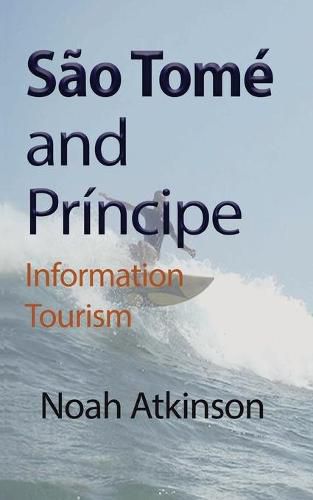Readings Newsletter
Become a Readings Member to make your shopping experience even easier.
Sign in or sign up for free!
You’re not far away from qualifying for FREE standard shipping within Australia
You’ve qualified for FREE standard shipping within Australia
The cart is loading…






This title is printed to order. This book may have been self-published. If so, we cannot guarantee the quality of the content. In the main most books will have gone through the editing process however some may not. We therefore suggest that you be aware of this before ordering this book. If in doubt check either the author or publisher’s details as we are unable to accept any returns unless they are faulty. Please contact us if you have any questions.
Sao Tome and Principe. Information Tourism. A Book on Sao Tome and Principe On 7 August 2016, Evaristo Carvalho, candidate of the ruling Accao Democratica Independente (ADI) was elected president of Sao Tome and Principe, Africa’s second smallest country and one of the very few African states with a semi-presidential system. For the first time in the country’s 25-year democratic history the candidate of the ruling party won the elections. However, unlike earlier elections in the small archipelago for the first time the elections were marked by accusations of irregularities that culminated in the refusal of the incumbent President Manuel Pinto da Costa, the second most voted candidate, to participate in the final ballot. President Carvalho is not expected to rigorously monitor or even complicate the government’s actions, since he is widely considered a proxy of Prime Minister Patrice Trovoada. Such harmony between government and president is unprecedented in Sao Tome and Principe, because in the previous five presidential elections the electorate has always preferred the cohabitation between the two office holders. A somewhat different situation only occurred in the free first presidential elections in 1991 when Miguel Trovoada, Patrice’s father, was elected unopposed president with the support of the Partido da Convergencia Democratica (PCD), which had won the preceding legislative elections. However, President Miguel Trovoada (1991-2001). Economy. Saotomean economy, as for those Small Island Developing States (SIDS), is strongly constrained by the insular nature of the country, its fragility, as well as by the resources’ constraints and the weakness of the absorption capacity. This results in an extreme vulnerability to external shocks and a strong dependence on official assistance (ODA), which funds more than 90 percent of investment spending (averaging 93.6 percent over the period 2012-2015).
$9.00 standard shipping within Australia
FREE standard shipping within Australia for orders over $100.00
Express & International shipping calculated at checkout
This title is printed to order. This book may have been self-published. If so, we cannot guarantee the quality of the content. In the main most books will have gone through the editing process however some may not. We therefore suggest that you be aware of this before ordering this book. If in doubt check either the author or publisher’s details as we are unable to accept any returns unless they are faulty. Please contact us if you have any questions.
Sao Tome and Principe. Information Tourism. A Book on Sao Tome and Principe On 7 August 2016, Evaristo Carvalho, candidate of the ruling Accao Democratica Independente (ADI) was elected president of Sao Tome and Principe, Africa’s second smallest country and one of the very few African states with a semi-presidential system. For the first time in the country’s 25-year democratic history the candidate of the ruling party won the elections. However, unlike earlier elections in the small archipelago for the first time the elections were marked by accusations of irregularities that culminated in the refusal of the incumbent President Manuel Pinto da Costa, the second most voted candidate, to participate in the final ballot. President Carvalho is not expected to rigorously monitor or even complicate the government’s actions, since he is widely considered a proxy of Prime Minister Patrice Trovoada. Such harmony between government and president is unprecedented in Sao Tome and Principe, because in the previous five presidential elections the electorate has always preferred the cohabitation between the two office holders. A somewhat different situation only occurred in the free first presidential elections in 1991 when Miguel Trovoada, Patrice’s father, was elected unopposed president with the support of the Partido da Convergencia Democratica (PCD), which had won the preceding legislative elections. However, President Miguel Trovoada (1991-2001). Economy. Saotomean economy, as for those Small Island Developing States (SIDS), is strongly constrained by the insular nature of the country, its fragility, as well as by the resources’ constraints and the weakness of the absorption capacity. This results in an extreme vulnerability to external shocks and a strong dependence on official assistance (ODA), which funds more than 90 percent of investment spending (averaging 93.6 percent over the period 2012-2015).